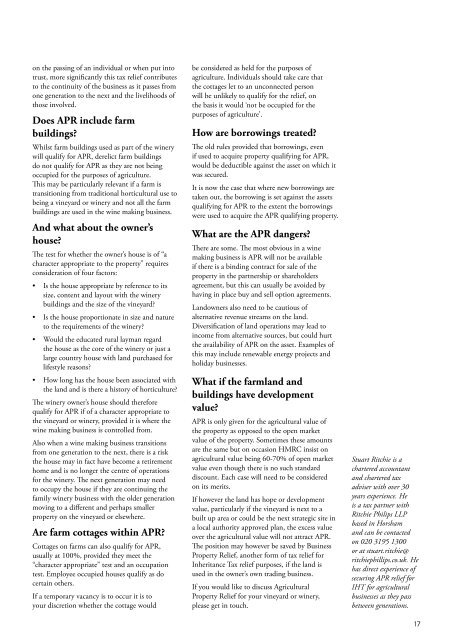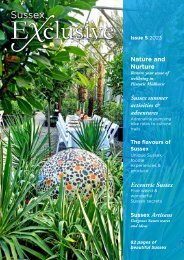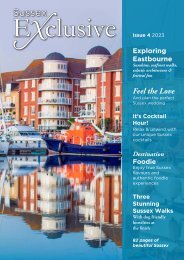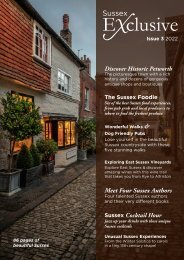Sussex Exclusive Magazine Edition II 2022
Bringing you the best of Sussex, from discovering Sussex vineyards to exploring Lewes and savouring Sussex foodie experiences. In this edition, we meet local artists, learn about Sussex folklore and legends, bring you mouth-watering recipes, mini break ideas, share wellbeing tips and advice, and more. Grab a coffee, put your feet up and please enjoy.
Bringing you the best of Sussex, from discovering Sussex vineyards to exploring Lewes and savouring Sussex foodie experiences. In this edition, we meet local artists, learn about Sussex folklore and legends, bring you mouth-watering recipes, mini break ideas, share wellbeing tips and advice, and more. Grab a coffee, put your feet up and please enjoy.
Create successful ePaper yourself
Turn your PDF publications into a flip-book with our unique Google optimized e-Paper software.
on the passing of an individual or when put into<br />
trust, more significantly this tax relief contributes<br />
to the continuity of the business as it passes from<br />
one generation to the next and the livelihoods of<br />
those involved.<br />
Does APR include farm<br />
buildings?<br />
Whilst farm buildings used as part of the winery<br />
will qualify for APR, derelict farm buildings<br />
do not qualify for APR as they are not being<br />
occupied for the purposes of agriculture.<br />
This may be particularly relevant if a farm is<br />
transitioning from traditional horticultural use to<br />
being a vineyard or winery and not all the farm<br />
buildings are used in the wine making business.<br />
And what about the owner’s<br />
house?<br />
The test for whether the owner’s house is of “a<br />
character appropriate to the property” requires<br />
consideration of four factors:<br />
• Is the house appropriate by reference to its<br />
size, content and layout with the winery<br />
buildings and the size of the vineyard?<br />
• Is the house proportionate in size and nature<br />
to the requirements of the winery?<br />
• Would the educated rural layman regard<br />
the house as the core of the winery or just a<br />
large country house with land purchased for<br />
lifestyle reasons?<br />
• How long has the house been associated with<br />
the land and is there a history of horticulture?<br />
The winery owner’s house should therefore<br />
qualify for APR if of a character appropriate to<br />
the vineyard or winery, provided it is where the<br />
wine making business is controlled from.<br />
Also when a wine making business transitions<br />
from one generation to the next, there is a risk<br />
the house may in fact have become a retirement<br />
home and is no longer the centre of operations<br />
for the winery. The next generation may need<br />
to occupy the house if they are continuing the<br />
family winery business with the older generation<br />
moving to a different and perhaps smaller<br />
property on the vineyard or elsewhere.<br />
Are farm cottages within APR?<br />
Cottages on farms can also qualify for APR,<br />
usually at 100%, provided they meet the<br />
“character appropriate” test and an occupation<br />
test. Employee occupied houses qualify as do<br />
certain others.<br />
If a temporary vacancy is to occur it is to<br />
your discretion whether the cottage would<br />
be considered as held for the purposes of<br />
agriculture. Individuals should take care that<br />
the cottages let to an unconnected person<br />
will be unlikely to qualify for the relief, on<br />
the basis it would ‘not be occupied for the<br />
purposes of agriculture’.<br />
How are borrowings treated?<br />
The old rules provided that borrowings, even<br />
if used to acquire property qualifying for APR,<br />
would be deductible against the asset on which it<br />
was secured.<br />
It is now the case that where new borrowings are<br />
taken out, the borrowing is set against the assets<br />
qualifying for APR to the extent the borrowings<br />
were used to acquire the APR qualifying property.<br />
What are the APR dangers?<br />
There are some. The most obvious in a wine<br />
making business is APR will not be available<br />
if there is a binding contract for sale of the<br />
property in the partnership or shareholders<br />
agreement, but this can usually be avoided by<br />
having in place buy and sell option agreements.<br />
Landowners also need to be cautious of<br />
alternative revenue streams on the land.<br />
Diversification of land operations may lead to<br />
income from alternative sources, but could hurt<br />
the availability of APR on the asset. Examples of<br />
this may include renewable energy projects and<br />
holiday businesses.<br />
What if the farmland and<br />
buildings have development<br />
value?<br />
APR is only given for the agricultural value of<br />
the property as opposed to the open market<br />
value of the property. Sometimes these amounts<br />
are the same but on occasion HMRC insist on<br />
agricultural value being 60-70% of open market<br />
value even though there is no such standard<br />
discount. Each case will need to be considered<br />
on its merits.<br />
If however the land has hope or development<br />
value, particularly if the vineyard is next to a<br />
built up area or could be the next strategic site in<br />
a local authority approved plan, the excess value<br />
over the agricultural value will not attract APR.<br />
The position may however be saved by Business<br />
Property Relief, another form of tax relief for<br />
Inheritance Tax relief purposes, if the land is<br />
used in the owner’s own trading business.<br />
If you would like to discuss Agricultural<br />
Property Relief for your vineyard or winery,<br />
please get in touch.<br />
Stuart Ritchie is a<br />
chartered accountant<br />
and chartered tax<br />
adviser with over 30<br />
years experience. He<br />
is a tax partner with<br />
Ritchie Philips LLP<br />
based in Horsham<br />
and can be contacted<br />
on 020 3195 1300<br />
or at stuart.ritchie@<br />
ritchiephillips.co.uk. He<br />
has direct experience of<br />
securing APR relief for<br />
IHT for agricultural<br />
businesses as they pass<br />
between generations.<br />
17










